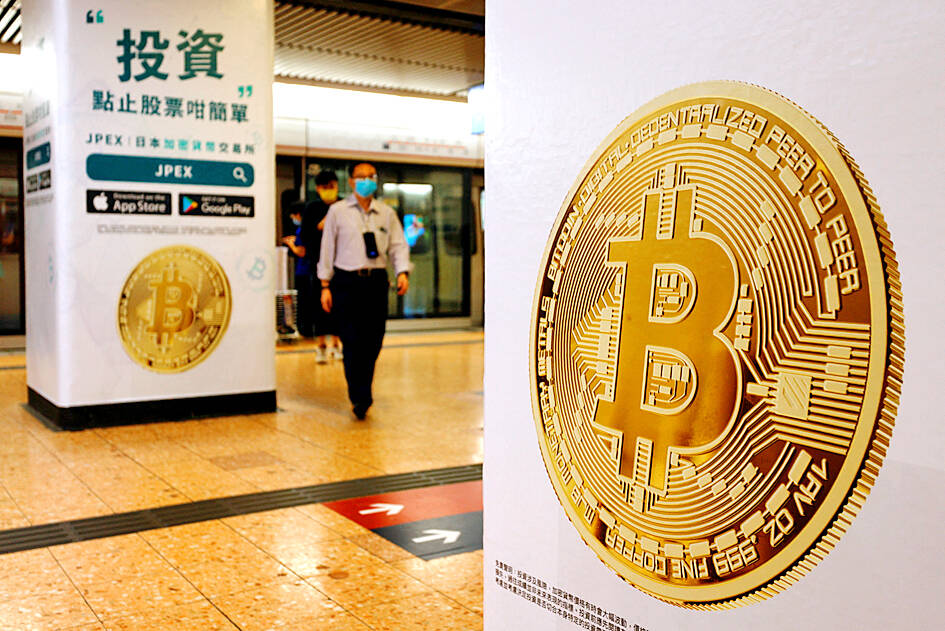Hong Kong is “back in business” and exploring whether to legalize crypto trading by retail investors, its finance chief announced yesterday, at the beginning of a week of conferences aimed at resuscitating the territory’s image.
In contrast to China where crypto has been all but banned, Hong Kong is looking to relax regulations and claw back some of the business that has left.
Years of strict COVID-19 pandemic controls and a political crackdown have hammered Hong Kong’s economy and sparked an exodus of talent that authorities say they now want to reverse.

Photo: Reuters
A fintech conference opened yesterday and is to be followed tomorrow by a finance summit attended by some of the world’s top bankers.
“Hong Kong is open and inclusive toward the global community of innovators engaging in virtual asset businesses,” Hong Kong Financial Secretary Paul Chan (陳茂波) told delegates at the fintech conference.
“In a great many ways, we are telling the world that we are back in business,” he said, in a speech that had to be delivered remotely after he caught COVID-19 last week during an overseas trip.
In a new policy statement the government said that it would launch a consultation to explore how the retail segment “may be given a suitable degree of access.”
It added that Hong Kong was willing to review “property rights for tokenized assets and the legality of smart contracts.”
Hong Kong restricts exchanges to clients with portfolios of at least HK$8 million (US$1 million).
Expanding permission to retail investors would allow far more regular residents to invest in cryptocurrencies and virtual assets, but that carries its own risks.
There has been a global push to regulate the crypto market and protect investors following wild swings and a string of high-profile collapses.
Critics say that crypto is an ideal tool to generate investment bubbles, hide illicit wealth and enable scams. China, once one of the world’s largest crypto markets, last year banned transactions of digital currencies.
Singapore recently reinforced regulations around retail transactions after a number of crypto exchanges imploded, including in the city-state, while Japan has recently relaxed some of its more conservative rules on listing tokens. Given its position as a gateway for China to international markets, Hong Kong was initially something of a crypto hub.
The territory then introduced a voluntary licensing regime in 2018 for big exchanges, but only two were approved for permits: BC Technology Group Co (品牌中國集團) and HashKey Group.
One of the biggest exchanges that used to be in Hong Kong, FTX Trading, moved to the Bahamas last year.

Mercuries Life Insurance Co (三商美邦人壽) shares surged to a seven-month high this week after local media reported that E.Sun Financial Holding Co (玉山金控) had outbid CTBC Financial Holding Co (中信金控) in the financially strained insurer’s ongoing sale process. Shares of the mid-sized life insurer climbed 5.8 percent this week to NT$6.72, extending a nearly 18 percent rally over the past month, as investors bet on the likelihood of an impending takeover. The final round of bidding closed on Thursday, marking a critical step in the 32-year-old insurer’s search for a buyer after years of struggling to meet capital adequacy requirements. Local media reports

AI BOOST: Although Taiwan’s reliance on Chinese rare earth elements is limited, it could face indirect impacts from supply issues and price volatility, an economist said DBS Bank Ltd (星展銀行) has sharply raised its forecast for Taiwan’s economic growth this year to 5.6 percent, citing stronger-than-expected exports and investment linked to artificial intelligence (AI), as it said that the current momentum could peak soon. The acceleration of the global AI race has fueled a surge in Taiwan’s AI-related capital spending and exports of information and communications technology (ICT) products, which have been key drivers of growth this year. “We have revised our GDP forecast for Taiwan upward to 5.6 percent from 4 percent, an upgrade that mainly reflects stronger-than-expected AI-related exports and investment in the third

TECHNOLOGICAL RIVALRY: The artificial intelligence chip competition among multiple players would likely intensify over the next two years, a Quanta official said Quanta Computer Inc (廣達), which makes servers and laptops on a contract basis, yesterday said its shipments of artificial intelligence (AI) servers powered by Nvidia Corp’s GB300 chips have increased steadily since last month, should surpass those of the GB200 models this quarter. The production of GB300 servers has gone much more smoothly than that of the GB200, with shipments projected to increase sharply next month, Quanta executive vice president Mike Yang (楊麒令) said on the sidelines of a technology forum in Taipei. While orders for GB200 servers gradually decrease, the production transition between the two server models has been

ASE Technology Holding Co (日月光投控), the world’s largest integrated circuit (IC) packaging and testing supplier, yesterday announced a strategic collaboration with Analog Devices Inc (ADI), coupled with the signing of a binding memorandum of understanding. Under the agreement, ASE intends to purchase 100 percent shares of Analog Devices Sdn Bhd and acquire its manufacturing facility in Penang, Malaysia, a press release showed. The ADI Penang facility is located in the prime industrial hub of Bayan Lepas, with an area of over 680,000 square feet, it said. In addition, the two sides intend to enter into a long-term supply agreement for ASE to